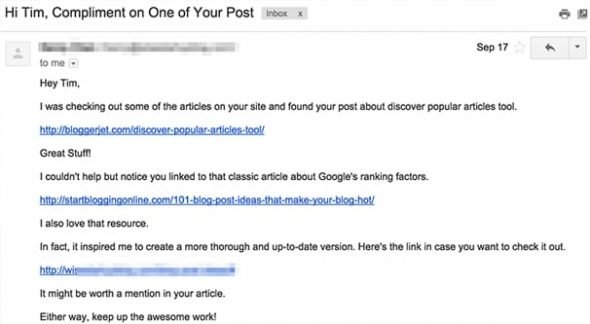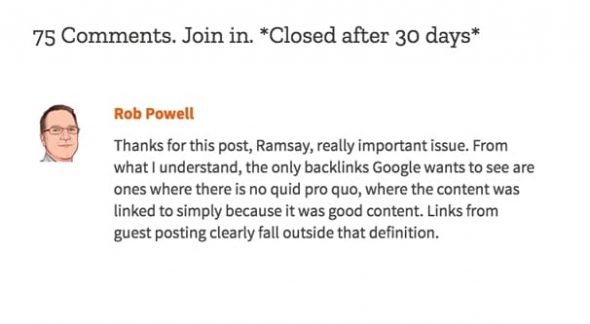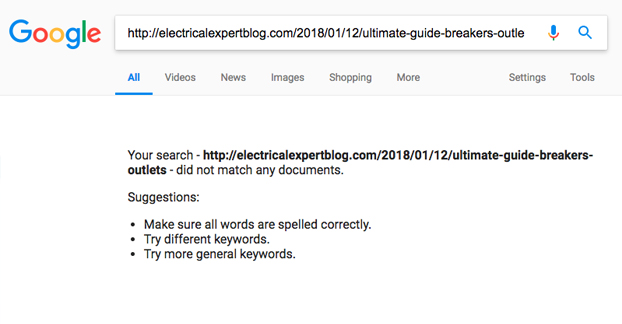Some people dive into guest posting and come out of it with a book deal, a thousand new subscribers, and a bunch of sales. Other people jump in and get essentially nothing out of it but some content on another site.
Everyone has different experiences, and there are a lot of factors that influence this. For some people, guest posting IS a waste of time. The thing is, more often than not, they’re going about it the wrong way.
I’m not gonna lie; there are some cases where guest posting isn’t a worthwhile technique. Some niche industries don’t have the kind of widespread appeal or potential customer base to make guest posting valuable. Most of the time, though, a few small changes can make guest posts pull their weight, and it’s not even that difficult to pull off.
Guest Blogging for Links is Dead
If you’re going into guest posting with the intention of building links to your site, you’re going to find that guest posting is a waste of time. Google has for years been telling everyone not to manipulate link juice, sculpt PageRank, or otherwise try to artificially game their algorithm.
As part of their ongoing campaign against manipulation, Google devalued a lot of guest posts. At the time, though, the average guest post was a 750-word piece of crap written just to get a few keywords and a link on another domain. There was no real value to it. You’d see one site write 100 different “The Basics of SEO” articles for 100 different sites. What does that add to anything? No one reading those posts is ignorant enough to learn anything from them. It’s all so valueless and transparent.
This is the primary issue called out by the Blog Tyrant in this post. Google killed guest posting, for a while, except they really didn’t.
Guest posting still maintains a lot of value specifically when you’re ignoring links. It’s completely fine to do so! After all, a vast majority of the time, the links you get from a guest post are going to be nofollowed, meaning they have no SEO value anyways.
I’ve covered the traffic issues as well. Guest posts aren’t there to build traffic to your site, though if you do include a link to some relevant article or landing page, you’ll get SOME traffic. You aren’t going to be rolling in a million new users barring some exceptional circumstance, though. More often than not, you’re only going to see a minor blip on your analytics, not even that much larger than what you would get from a normal post on your own site, a social media link, or some other share.
Sales Lion wrote their own post about how guest posting is a waste of time. In it, they list three main benefits to guest posting. One is links, one is mailing list subscribers, and one is exposure.
I call this a bit of a false premise. They downplay exposure’s role in gaining new readers over time, for one thing. We joke about how being paid in exposure is valueless, and it is for a freelancer providing actual work, but name recognition is a very powerful thing. That’s why those social proof boxes on websites with logos of recognizable sites are so valuable. You might not know the name of my brand, but if you recognize my profile image from a post on Entrepreneur you remember liking, you’re going to give me a second look. That’s both very valuable and very hard to track.
The second benefit, links, we’ve already discussed. And their third benefit, mailing list subscribers, is just another way of saying traffic, or conversions, or whatever other tangible metric you’re trying to measure.
Look at it this way. How often do you visit a site you’ve never seen before online? It’s fairly often for me, because I’m constantly out reading about new topics and upcoming trends. How often, though, do you decide you want to sign up for that site’s mailing list when you are first exposed to them? I don’t know about you, but I virtually never register for any kind of mailing list, let alone one for a brand I’m not familiar with. Any sort of conversion has to be carefully considered, and one mention from a guest post isn’t likely to sway me.
On the other hand, there are other sources of value from guest posts. Implied links and brand mentions are both implied to be part of the modern Google algorithm, and they’re certainly part of public consciousness. It’s all about that awareness and recognition. Google is slowly, subtly, trying to build some way to quantify recognition in their algorithm.
Low Quality Outreach
One of the main points Sales Lion makes in their post is that some industries simply don’t have good niche blogs to use for guest posting. As marketers and SEO specialists we have thousands of blogs to choose from. Someone like the Sales Lion client, a kitchen appliance specialist, is a much smaller and much less marketed niche. There aren’t liable to be very many kitchen appliance focused blogs that are relevant for a guest post.
Or are there? Let’s think a little harder about it. Here are some blogs this hypothetical kitchen appliance salesman could use for guest posts.
- An affiliate marketing site specializing in kitchen appliances. Sure, the affiliate marketer wants to send people to Amazon or their preferred warehouse for sales, but that doesn’t mean they wouldn’t want specialized content they don’t have to create or pay for. Besides, the Boston-based salesman doesn’t care about traffic outside of his area of influence, so he’s not likely to lose sales from the guest post. Plus, there’s an opportunity here! What if the affiliate marketer is willing to send Boston-specific traffic to the Boston salesman, whereas other traffic can go to normal affiliate links? Both parties benefit from an impromptu referral program.
- Any marketing site, especially niche marketing sites. You know what marketing-focused sites absolutely love? Data! If our Boston-based salesman can bring some analytics data to the table and write up a case study about how certain marketing techniques worked or didn’t work, that case study can be an excellent piece of data and source of links for months. You can’t tell me a niche marketer wouldn’t love to have that kind of content just handed to them.
- Any local Boston blog. Not every city has an active blogosphere, but a city like Boston certainly does. A local business owner can bring both data and anecdotes to the table, and can bring their own unique perspective on local happenings to any geographically relevant blog.
The argument that certain niches don’t have good guest blogging targets is only true as long as you’re not creative enough to dig in to find those opportunities. The bar is pretty low, after all; all you need to do is find a potentially relevant topic, and make sure the blog has readers and is not spam itself. That’s pretty much it!
Sales Lion doesn’t think like this, though, because they’re focused on the idea that the end result of guest posting should be sales. In the sense that everything leads to more sales, sure, that’s relevant. The guest posting ideas above, though, can all bring value to a site. The implied value from Google, the actual value of a link, potential referrals, and other sorts of value can all come from these “waste of time” posts.
I will say that one comment left on the Sales Lion post brings up a very important point. Ari Herzog from New Media Explorer mentions that many marketers and business owners submit a guest post, go through the motions, and then once it’s published, drop off the map.
How many times have I mentioned awareness and recognition as important sources of value? When someone leaves a comment on a guest post you write, you should stick around to reply to that comment. I understand that a lot of blog owners barely even comment on their own sites, and to me that’s a lot of missed opportunities. Respond to comments so you can build even more awareness, even more recognition, from people who had their questions answered directly. Heck, those people are even more likely to subscribe to you in the future.
Plus, comments are excellent places to drop links for further reading. If you write a post about, say, kitchen sink plumbing, and someone comments asking advice on a faucet, you can easily link to a post you wrote about faucets to give them further reading on your site. It’s an excellent way to draw even more people into your circle of influence.
How to Guarantee Value from Guest Posts
If you want to absolutely guarantee that your guest posts will never be a waste of time, all you really need to do is follow a few simple guidelines.
First, you need to make sure your guest post targets, the sites hosting your content, are worthwhile. You don’t need to post on some terrible, barely-visible blog with 5 readers per month just because it’s the only thing in your niche. Look outside your niche, and then figure out where the overlap is in the Venn diagram between your topics and theirs. I gave you some ideas above, just put them into practice.
Second, you need to write something that is worthwhile to the readers of the blog you’re posting on. It doesn’t need to be valuable to your own readers, since you’re not sending your traffic back to them. You want the people who read the post to be interested in its content, so you need to write something relevant to the host.
Obviously, your content needs to meet minimum standards. It needs to be unique, long enough to be worthwhile, and contain relevant data and citations. High quality, unique content is not just essential, it’s the bare minimum you can possible invest in guest posting.
Third, you need to maintain an active presence around the post for at least a month. I don’t expect you to set up notifications for every comment on every post you ever write, but you want to keep that audience hooked for at least a few weeks. Eventually the traffic and the comments will taper off anyway.
As I mentioned above, responding to comments can be a great way to build recognition. On top of that, the link opportunities are virtually endless. Plus, sometimes an insightful blogger will have something to say, and you can quote them in a later post, link to their site if they have one, or otherwise strike up another relationship. You never know what kind of opportunities can open up from a conversation you have in the comments of some other blog.
Fourth, you need a way to capture the value from a guest post when it happens. Maybe that means you need a good call to action in your author bio pointing towards an ebook you wrote. Maybe it just means having a strong presence on your site pushing people to subscribe to your newsletter. Maybe it just means referring people to other content they’ll be interested in, which itself has another call to action.
Just remember, guest posts don’t need to directly push sales. It’s a tertiary goal. A guest post gets people aware of you, and gets people who are aware of you to investigate you. It’s the purpose of the rest of your blog to hook those people, and your landing pages to push people to subscribe or purchase. Everything operates in steps.
 ContentPowered.com
ContentPowered.com









